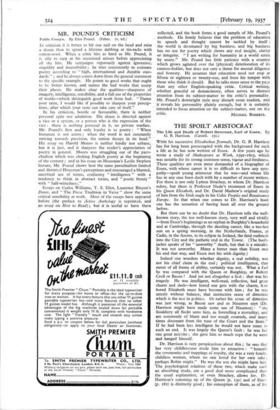MR. POUND'S CRITICISM
Polite Essays. By Ezra Pound. (Faber. 7s. 6d.)
IN criticism it is better to hit one nail on the head-and miss a dozen than to spend a lifetime dabbing at tin-tacks with cotton-wool. When a critic hits as hard as Mr. Pound, it is silly to . carp at his occasional misses before appreciating all the hits: He campaigns vigorously against ignorance, stupidity and insensibility ; he• tries consistently to estimate poetry according to "high, international and durable stan- dards " ; and he always comes down from the general statement to the specific example. He points to good works that ought to be better known, and names the bad works that usurp their places. He makes clear the qualities—sharpness of imagery, intelligence, sensibility, and a full use of the properties of words—which distinguish good work from bad. "Damn your taste, I would like if possible to sharpen your percep- tions, after which your taste can take care of itself.'
In his criticism, hostile or favourable, there is neither personal spite nor adulation. His abuse is directed against a vice or a system, or a person who is the expression of the vice : there is nothing personal in it, no private warfare. Mr. Pound's first and only loyalty is to poetry : "When literature is not active ; when the word is not constantly striving towards precision, the nation decays in its head." His essay on Harold Monro is neither kindly nor urbane, but it is just, and it sharpens the reader's appreciation of poetry in general. Monro was struggling out of the paro- chialism which was choking English poetry at the beginning of the century ; and in his essay on Housman's Leslie Stephen lecture, Mr. Pound shows how the same parochialism limited and distorted Housman's perceptions and encouraged a blurred, uncritical use of terms, confusing " intelligence " with a tendency to think in abstract terms, and "poetic frenzy" with "half-wittedness."
Essays on Carlos Williams, T. S. Eliot, Laurence Binyon's Dante, and "The Prose Tradition in Verse" show the same critical sensibility at work. Most of the essays have appeared before (the preface to Active Anthology is reprinted, and an essay on How to Read); but it is useful to have them
collected, and the book forms a good sample of Mr. Pound's _ methods. He firmly believes that the problem of education in speech and thought cannot be tackled by itself : • the world is dominated by big business, and big business has no use for poetry which shows any real insight, clarity • or integrity. "I am writing for humanity in a world eaten by usury." Mr. Pound has little patience with a country which grows agitated over the (physical) deterioration of its cannon-fodder, but does not care a damn for mental diligence and honesty. He assumes that education need not stop at fifteen or eighteen or twenty-one, and loses his temper with those who think it should. But he talks more sense to the page than any other English-speaking critic. Critical writing, whether graceful or denunciatory, often serves to distract - attention from its subject-matter to the critic's personality. Mr. Pound's downright style may disturb some readers, and it reveals his personality plainly enough, but it is certainly intended to focus attention on the subject-matter, not on the critic.
MICHAEL ROBERTS.














































 Previous page
Previous page